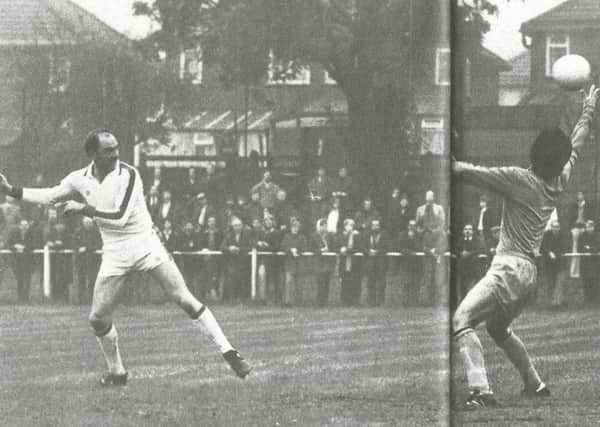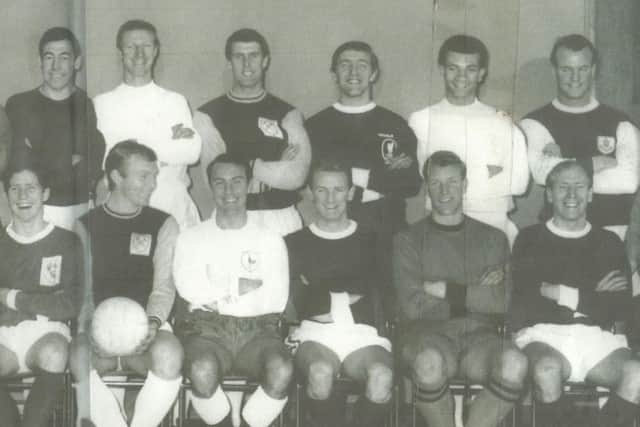Nostalgia: A look back on Morecambe FC manager Jim Bentley's father


I would imagine that very few, if any, football clubs have had three World Cup winners as their manager but Telford United hold this proud record.
Ron Flowers, Geoff Hurst and Gordon Banks all took the reins at Telford but their experience and skill on the field did not translate to the manager’s office. Ron Flowers left Wolves in September 1967 to join Northampton Town, where he later became player/manager.
Advertisement
Hide AdAdvertisement
Hide AdHe ended his playing career at non-league Wellington Town (latterly known as Telford United) as player-manager before retiring in 1971 to run a sports shop in Wolverhampton.


Upon his retirement from playing, Geoff Hurst moved into management and coaching. He spent three years as player-manager of Telford United from 1976-79 in the Southern League before being recruited by Ron Greenwood in the England coaching set up in 1979.
Gordon Banks accepted the role as manager of Alliance Premier League club Telford United in 1979. He signed a goalkeeper, centre-half and centre-forward from Bangor City for £1,500, as well as former Stoke striker John Ruggiero.
The ‘Bucks’finished in 13th place in 1979–80. In November 1980, he left Jackie Mudie in temporary charge of team affairs whilst he underwent surgery, who led the club to defeat in the FA Trophy at the hands of a lower league club.
On his return to the club Banks was sacked.


Advertisement
Hide AdAdvertisement
Hide AdHe was offered the position of raffle-ticket seller, and accepted the post in the belief that it would entitle him to the money owed to him in the terms of his management contract; he eventually had to settle for 50 per cent of his contract. He later stated that “It broke my heart...I did not want to stay in the game.”
In October 1976 Telford United played Tividale, a West Midlands club, in the second qualifying round of the FA Cup before a crowd of 1,007 at The Beeches, formerly Parkwood Road.
The home side were hoping to progress to the next round but those hopes were dashed inside two minutes when Jack Bentley scored for Telford.
The report in the newspaper went something like this, “The players drift into the bar, still talking about the match.
Advertisement
Hide AdAdvertisement
Hide Ad“Jeff, a tall pleasant man who has given a great deal to the team, is shaking his head in rueful admiration.
“You read all about him for years in the papers, all those goals, and tell yourself there must be some way to stop him.
“Well there isn’t. You know where the danger is, you watch him like a hawk and still he gets away and stuffs you. He’s a bit magic.”
Then you realise he is not talking about Geoff Hurst, the England International World Cup Winner, but Jack Bentley, a man whose write-ups have appeared in newspapers published west of the M6, but who is in some ways, an even bigger name among the players at this level than Hurst.
Advertisement
Hide AdAdvertisement
Hide Ad“Hurst did it in another world, the league, England and all that but Bentley has got his 400 plus goals down here against the sort of players we know on the sort of pitches we play on,” said Jeff, the man from the bar included in the newspaper report earlier.
“That doesn’t make him better, of course, but you can take in what he has done more easily, somehow. He’s sort of more real.”
Geoff Hurst, too, is quick to praise Bentley’s contribution.
He said: “Especially that second goal, see how it came, near the post. That move, that’s earned me a fair living in the game.
Advertisement
Hide AdAdvertisement
Hide Ad“I’ve been trying to get Telford used to it, getting people to stick the ball in early for the strikers to go and find. But Jack wasn’t in on the discussions because he doesn’t come down from Liverpool for training.
“So how come he was there and ready? Instinct. He’s a natural. I can’t make out how he has been left down here all these years.”
The result of the game was a 3-0 victory for Telford with Bentley (2) and Hurst scoring. They would beat Hednesford Town 3-0 in the next round before going out 2-5 to Matlock Town in the fourth qualifying round.
Former Manchester United manager, Ron Atkinson, always claimed that the best header of a ball he ever saw was Jack Bentley and he scored 431 goals in 835 matches over 14 years, many with his head.
Story sponsored by Bay Camera and Communications.